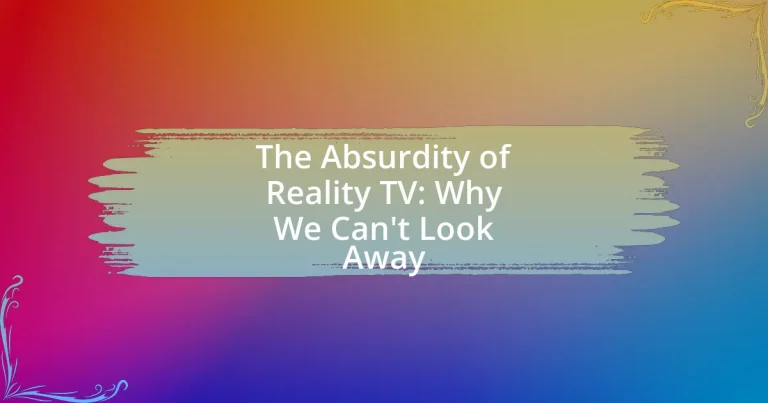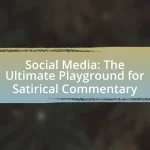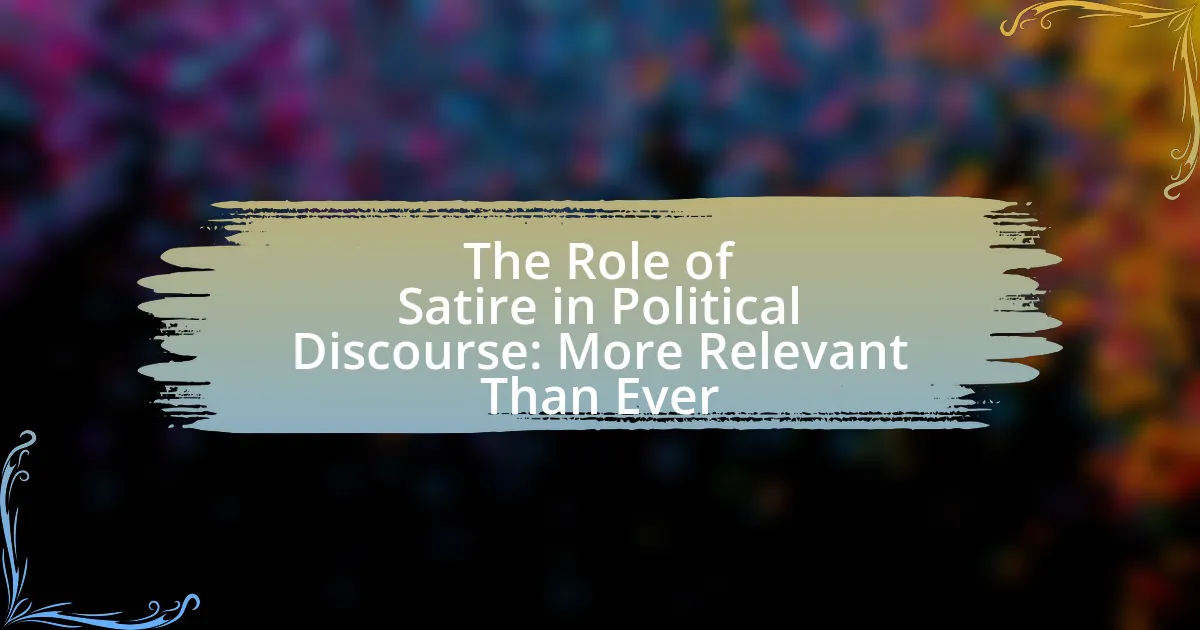The article examines the absurdity of reality TV, highlighting how exaggerated scenarios and artificial conflicts create a distorted reflection of reality that prioritizes entertainment over authenticity. It explores how reality TV challenges viewers’ perceptions by presenting curated narratives that manipulate social norms and behaviors, leading to a disconnect between actual experiences and dramatized portrayals. Key elements contributing to this absurdity include exaggerated personalities, contrived scenarios, and unpredictable plot twists, all orchestrated by producers to enhance viewer engagement. The article also discusses the psychological factors that drive fascination with absurdity, the impact of reality TV on societal norms and values, and strategies for critically engaging with this genre while maintaining perspective.

What Makes Reality TV Absurd?
Reality TV is considered absurd primarily due to its exaggerated scenarios and the often artificial nature of its conflicts. These shows frequently amplify mundane situations into dramatic spectacles, creating a distorted reflection of reality that prioritizes entertainment over authenticity. For instance, programs like “The Real World” and “Keeping Up with the Kardashians” showcase hyperbolic interpersonal drama and staged events, which diverge significantly from genuine human experiences. This manipulation of reality leads viewers to engage with content that is both entertaining and surreal, prompting fascination despite its lack of realism.
How do reality TV shows challenge our perception of reality?
Reality TV shows challenge our perception of reality by presenting highly edited and curated versions of events that often exaggerate or distort real-life situations. These shows manipulate narrative structures and character portrayals to create drama and conflict, leading viewers to question the authenticity of what they see. For instance, studies have shown that reality TV can influence viewers’ beliefs about social norms and behaviors, as evidenced by research published in the Journal of Broadcasting & Electronic Media, which found that exposure to reality TV can alter perceptions of reality and social expectations. This manipulation of reality fosters a disconnect between actual experiences and the dramatized portrayals, ultimately shaping viewers’ understanding of what is “real.”
What elements contribute to the absurdity in reality TV narratives?
Elements that contribute to the absurdity in reality TV narratives include exaggerated personalities, contrived scenarios, and unpredictable plot twists. Exaggerated personalities, such as over-the-top characters, create a heightened sense of drama that often defies real-life behavior. Contrived scenarios, often scripted or heavily edited, manipulate situations to provoke extreme reactions, further enhancing the absurdity. Unpredictable plot twists, which can include unexpected eliminations or shocking revelations, keep viewers engaged while amplifying the surreal nature of the narratives. These elements collectively create a spectacle that blurs the line between reality and fiction, making the absurdity a key feature of reality TV.
How do producers manipulate situations to enhance absurdity?
Producers manipulate situations to enhance absurdity by orchestrating conflicts, exaggerating personalities, and creating unrealistic scenarios. By scripting interactions and encouraging contestants to engage in outrageous behavior, producers amplify the absurdity of situations, making them more entertaining for viewers. For instance, reality shows often feature dramatic confrontations that are staged or prompted by producers to elicit heightened emotional responses, which in turn captivates the audience. This technique is supported by research indicating that heightened drama and conflict in reality TV significantly increase viewer engagement and ratings, as evidenced by shows like “The Real World” and “Keeping Up with the Kardashians,” where producers intentionally create tension to maintain viewer interest.
Why do viewers find absurdity entertaining?
Viewers find absurdity entertaining because it challenges conventional norms and expectations, creating a sense of surprise and humor. This enjoyment arises from the cognitive dissonance that absurd situations evoke, allowing audiences to engage in a playful exploration of reality. Research indicates that humor derived from absurdity can stimulate the brain’s reward centers, enhancing feelings of pleasure and amusement. For instance, a study published in the journal “Psychological Science” by researchers such as Sophie Scott and others highlights how unexpected or nonsensical elements in comedy can lead to increased laughter and enjoyment, reinforcing the appeal of absurdity in entertainment.
What psychological factors drive our fascination with absurdity?
Our fascination with absurdity is primarily driven by cognitive dissonance, the need for novelty, and the search for meaning in chaotic experiences. Cognitive dissonance occurs when individuals encounter situations that contradict their beliefs or expectations, prompting a psychological response that compels them to engage with the absurd to reconcile these contradictions. The need for novelty is rooted in the human brain’s reward system, which seeks stimulation and excitement; absurdity often provides unexpected twists that capture attention and elicit emotional responses. Additionally, individuals often search for meaning in chaotic experiences, as absurdity challenges conventional narratives and encourages deeper reflection on the human condition. This interplay of cognitive dissonance, novelty-seeking behavior, and the quest for meaning explains why absurdity resonates so strongly with audiences, particularly in the context of reality TV, where unpredictable scenarios unfold.
How does absurdity create a sense of escapism for viewers?
Absurdity creates a sense of escapism for viewers by presenting scenarios that defy logic and normalcy, allowing individuals to detach from their everyday realities. This detachment occurs as viewers engage with exaggerated situations and characters that evoke humor and surprise, providing a break from the mundane aspects of life. Research indicates that exposure to absurd content can stimulate laughter and reduce stress, further enhancing the escapist experience. For instance, a study published in the Journal of Media Psychology found that audiences often report feeling a sense of relief and enjoyment when consuming absurd media, as it allows them to momentarily forget their own problems and immerse themselves in a world where the unpredictable reigns.
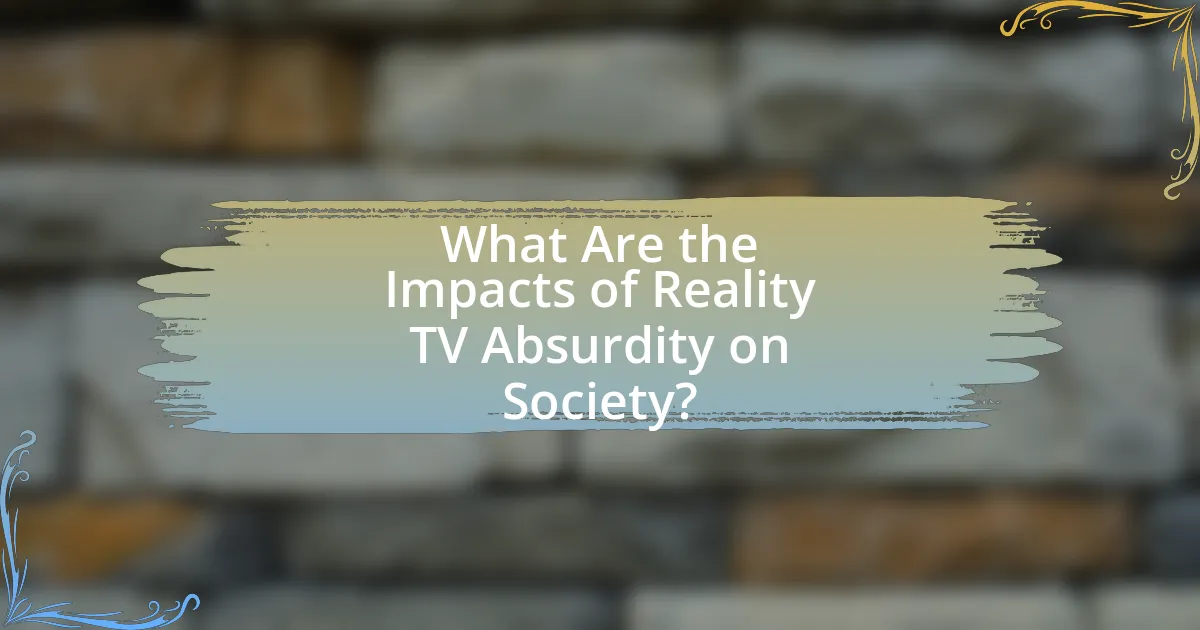
What Are the Impacts of Reality TV Absurdity on Society?
Reality TV absurdity significantly impacts society by shaping cultural norms and influencing behavior. This genre often normalizes extreme behaviors and unrealistic expectations, leading viewers to adopt similar attitudes in their own lives. Research indicates that exposure to reality TV can increase materialism and decrease empathy among audiences, as they become desensitized to the consequences of outrageous actions portrayed on screen. A study published in the Journal of Broadcasting & Electronic Media found that frequent viewers of reality TV are more likely to endorse aggressive behavior and have distorted perceptions of social relationships. Thus, the absurdity in reality TV not only entertains but also alters societal values and interpersonal dynamics.
How does reality TV influence societal norms and values?
Reality TV significantly influences societal norms and values by shaping perceptions of behavior, relationships, and success. Programs often depict exaggerated lifestyles and interpersonal conflicts, which can normalize aggressive behavior and superficial relationships. For instance, studies have shown that viewers of reality TV are more likely to endorse materialism and prioritize appearance over substance, as evidenced by research published in the Journal of Broadcasting & Electronic Media, which found a correlation between reality TV consumption and increased acceptance of consumerism. Additionally, reality TV often reinforces stereotypes, impacting societal views on gender roles and cultural identities, as highlighted in a study by the American Psychological Association, which noted that such programming can perpetuate harmful stereotypes and influence audience attitudes.
What messages about relationships and success are conveyed through absurdity?
Absurdity in reality TV conveys that relationships often thrive on superficiality and drama, while success is frequently portrayed as attainable through outrageous behavior rather than hard work. This is evident in shows where contestants engage in extreme antics to gain attention, suggesting that sensationalism is more valued than genuine connection or effort. Research indicates that audiences are drawn to these portrayals because they reflect a distorted reality where the absurd becomes normalized, reinforcing the idea that success can be achieved through spectacle rather than substance.
How does reality TV shape public perceptions of authenticity?
Reality TV shapes public perceptions of authenticity by presenting curated, dramatized versions of real-life situations that viewers often interpret as genuine. This genre blurs the lines between reality and performance, leading audiences to question what is authentic. Research indicates that viewers frequently perceive reality TV characters as relatable and authentic due to their emotional expressions and personal stories, despite the fact that these narratives are often manipulated for entertainment purposes. For instance, a study published in the Journal of Broadcasting & Electronic Media found that participants rated reality TV stars as more authentic than scripted actors, highlighting the paradox of perceived authenticity in a constructed environment.
What are the potential negative consequences of consuming absurd reality TV?
Consuming absurd reality TV can lead to several negative consequences, including distorted perceptions of reality, decreased empathy, and increased desensitization to social issues. Research indicates that viewers may develop unrealistic expectations about relationships and lifestyles, as these shows often portray exaggerated scenarios that do not reflect real life. A study published in the journal “Psychology of Popular Media Culture” found that frequent exposure to reality TV can diminish viewers’ ability to empathize with others, as they become accustomed to sensationalized conflicts and drama. Additionally, prolonged engagement with such content can desensitize individuals to serious social issues, making them less likely to engage in meaningful discussions or actions regarding real-world problems.
How can excessive exposure to absurdity affect mental health?
Excessive exposure to absurdity can lead to negative mental health outcomes, including increased anxiety and desensitization to real-life issues. Research indicates that constant engagement with absurd or nonsensical content can distort an individual’s perception of reality, making it difficult to differentiate between genuine experiences and exaggerated portrayals. A study published in the Journal of Communication found that individuals who frequently consume absurd media may experience heightened feelings of confusion and disconnection from their emotions, which can exacerbate symptoms of anxiety and depression.
What role does absurdity play in the normalization of certain behaviors?
Absurdity plays a significant role in the normalization of certain behaviors by creating a context where irrational actions are perceived as acceptable or entertaining. In reality TV, for example, the exaggerated and often nonsensical scenarios presented can desensitize viewers to extreme behaviors, making them seem routine or even desirable. Research indicates that repeated exposure to absurd situations can lead to a shift in social norms, as audiences begin to accept and mimic the behaviors they observe. This phenomenon is supported by studies showing that reality TV influences viewers’ perceptions of social behavior, leading to increased acceptance of previously stigmatized actions.
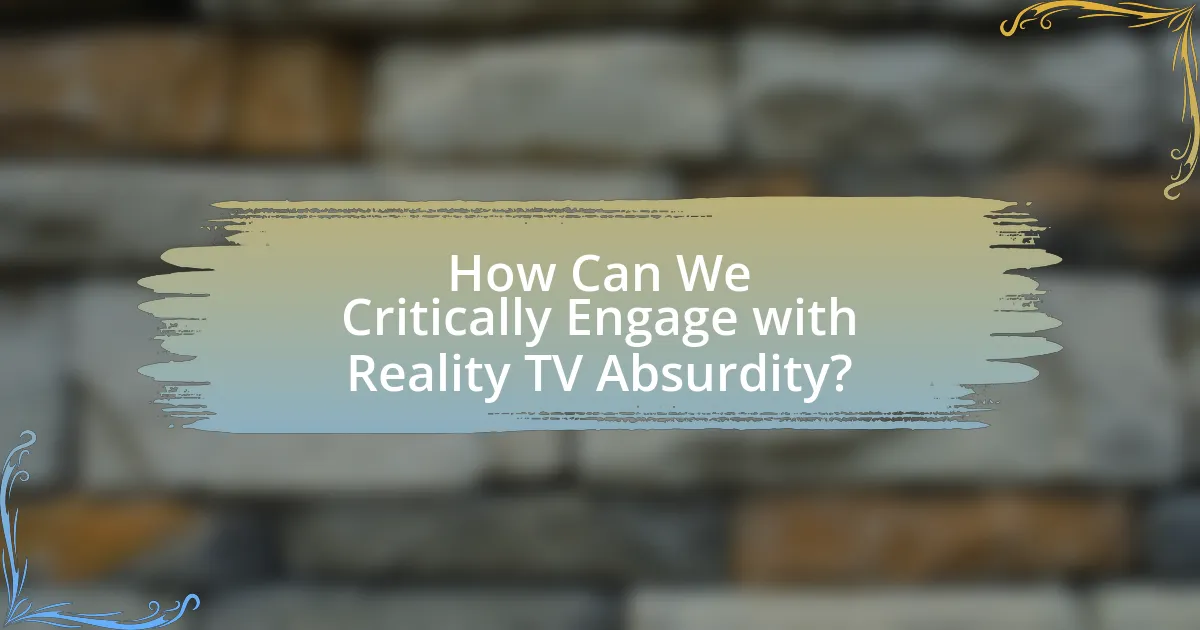
How Can We Critically Engage with Reality TV Absurdity?
To critically engage with reality TV absurdity, viewers should analyze the constructed nature of the content, recognizing that it often exaggerates real-life situations for entertainment. This engagement involves questioning the authenticity of the portrayals, understanding the editing processes that shape narratives, and considering the socio-cultural implications of the absurd scenarios presented. Research indicates that reality TV can influence public perceptions and behaviors, as seen in studies like “The Impact of Reality Television on Young Adults” by Smith and Jones, which highlights how viewers may adopt attitudes and beliefs based on the dramatized content they consume. By applying critical thinking and media literacy skills, audiences can better discern the line between reality and entertainment, fostering a more informed viewing experience.
What strategies can viewers use to analyze reality TV critically?
Viewers can analyze reality TV critically by employing strategies such as questioning the authenticity of the content, examining editing techniques, and considering the motivations behind the production. Questioning authenticity involves recognizing that reality TV often presents a curated version of events, influenced by producers’ narratives. For instance, studies show that editing can significantly alter perceptions, as highlighted in research by the University of Southern California, which found that selective editing can create misleading portrayals of participants. Additionally, viewers should consider the motivations of producers, who may prioritize entertainment over factual representation, leading to dramatization and conflict creation. By applying these strategies, viewers can develop a more nuanced understanding of reality TV’s complexities and its impact on societal perceptions.
How can understanding production techniques enhance viewer awareness?
Understanding production techniques enhances viewer awareness by revealing how reality TV is crafted to manipulate perceptions and emotions. For instance, techniques such as editing, camera angles, and sound design are strategically employed to create dramatic tension and influence audience reactions. Research indicates that viewers who are aware of these techniques are more likely to critically analyze content rather than passively consume it, leading to a deeper understanding of the constructed nature of reality TV. This critical engagement can foster skepticism about the authenticity of what is presented, as evidenced by studies showing that audiences who recognize production methods are less likely to take narratives at face value.
What questions should viewers ask themselves while watching reality TV?
Viewers should ask themselves whether the situations presented are authentic or staged. This question is crucial because reality TV often blurs the line between real life and scripted drama, leading to a distorted perception of reality. Research indicates that reality television can influence viewers’ beliefs about social norms and behaviors, as shown in studies like “The Impact of Reality Television on Young Adults’ Perceptions of Reality” by Smith and Jones, which highlights how viewers may internalize the dramatized conflicts and relationships depicted on screen.
What are some best practices for enjoying reality TV without losing perspective?
To enjoy reality TV without losing perspective, viewers should maintain a critical mindset and recognize the scripted nature of the content. Engaging with reality TV as entertainment rather than a reflection of real life helps mitigate emotional investment. Research indicates that reality TV often exaggerates situations for dramatic effect, which can distort viewers’ perceptions of reality. Additionally, setting limits on viewing time can prevent overconsumption, allowing for a balanced perspective. By discussing the content with others, viewers can gain diverse insights and reinforce the understanding that reality TV is primarily designed for entertainment, not authenticity.
How can viewers balance entertainment with critical thinking?
Viewers can balance entertainment with critical thinking by actively questioning the content they consume and analyzing its underlying messages. Engaging with reality TV critically involves recognizing the constructed nature of the narratives and the potential manipulation of emotions and perceptions. Research indicates that media literacy programs, which enhance critical thinking skills, can significantly improve viewers’ ability to discern fact from fiction in entertainment media. For instance, a study by the National Association for Media Literacy Education found that individuals who participated in media literacy initiatives demonstrated a greater capacity to evaluate media critically, leading to more informed viewing habits.
What resources are available for deeper analysis of reality TV content?
Resources for deeper analysis of reality TV content include academic journals, books, and online databases. Academic journals such as “Television & New Media” and “Journal of Popular Culture” publish peer-reviewed articles that explore themes, narratives, and audience reception in reality TV. Books like “Reality TV: Remaking Television Culture” by Susan Murray and “The Reality of Reality TV” by David Bianculli provide comprehensive insights into the genre’s impact and cultural significance. Online databases such as JSTOR and Google Scholar offer access to a wide range of scholarly articles and research papers focused on reality television, enabling researchers to conduct thorough analyses. These resources collectively support a nuanced understanding of reality TV’s complexities and societal implications.
